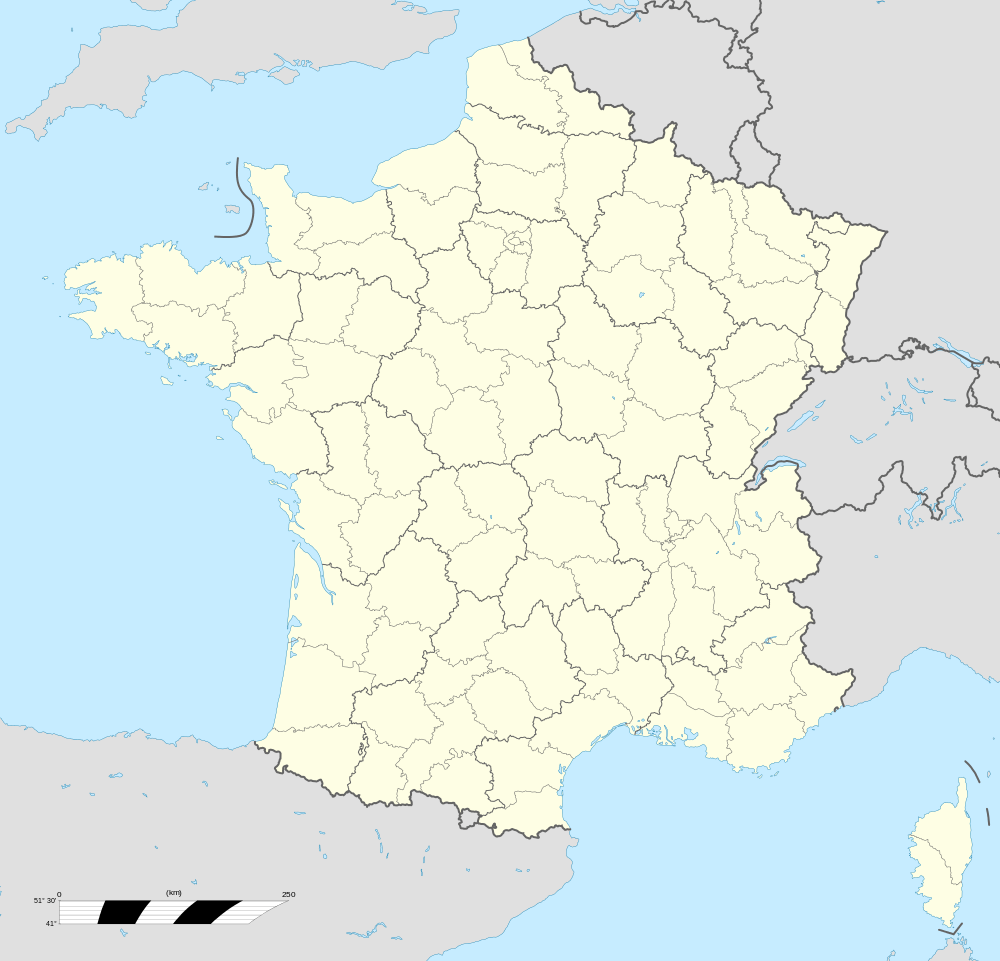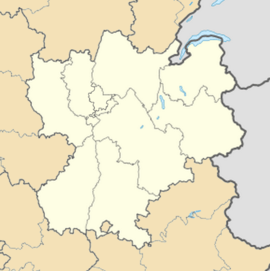Montbrison, Loire
| Montbrison | ||
|---|---|---|
|
The collegiate church in Montbrison | ||
| ||
 Montbrison | ||
|
Location within Rhône-Alpes region  Montbrison | ||
| Coordinates: 45°36′30″N 4°03′57″E / 45.6083°N 4.0658°ECoordinates: 45°36′30″N 4°03′57″E / 45.6083°N 4.0658°E | ||
| Country | France | |
| Region | Rhône-Alpes | |
| Department | Loire | |
| Arrondissement | Montbrison | |
| Canton | Montbrison | |
| Intercommunality | Loire Forez | |
| Government | ||
| • Mayor (2001–2008) | Philippe Weyne | |
| Area1 | 16.33 km2 (6.31 sq mi) | |
| Population (1999)2 | 21,589 | |
| • Density | 1,300/km2 (3,400/sq mi) | |
| INSEE/Postal code | 42147 / 42600 | |
| Elevation |
370–552 m (1,214–1,811 ft) (avg. 399 m or 1,309 ft) | |
|
1 French Land Register data, which excludes lakes, ponds, glaciers > 1 km² (0.386 sq mi or 247 acres) and river estuaries. 2 Population without double counting: residents of multiple communes (e.g., students and military personnel) only counted once. | ||
Montbrison is a commune in the Loire department in central France.
The commune gives its name to the popular blue cheese Fourme de Montbrison, which has been made in the region for centuries. It received Appellation d'Origine Contrôlée status in 1972.
History
The town of Montbrison was founded in the area around the lords' castles in the Forez region, of which Montbrison would later become the capital. The earliest recorded reference to the town dates to 870CE.
The town was fortified following the attacks by the English army at the start of the Hundred Years War. During the Religious Wars, Montbrison was captured and pillaged by the Protestant forces of François de Beaumont in 1562, with the town's garrison thrown from the ramparts onto spikes placed by the attackers.[1]
The Convent of the Visitation was founded in 1643 during a period of severe famine. The town suffered a series of poor harvests as well as an outbreak of the plague between the years 1648-1653. The Augustinian Convent was founded in 1654, followed by the Hospital to house the poor in 1659. The Ursuline Convent closed in 1851.
Key dates
- 1892 - execution of Ravachol, a noted anarchist
- 1909 - electrical power reaches the town
- 1940 - (June) the Forez region is occupied by German troops, with Montbrison falling into the 'free' zone. The forces withdrew at the start of July
- 1944 - (August) Montbrison liberated
- 1954 - Water treatment plant built
- 1968 - Jacquou le Croquant broadcast on television
- 1972 - local cheese Fourme de Montbrison receives Appellation d'Origine Contrôlée status
Population
| Historical population | ||
|---|---|---|
| Year | Pop. | ±% |
| 1962 | 10,697 | — |
| 1968 | 11,213 | +4.8% |
| 1975 | 12,451 | +11.0% |
| 1982 | 13,280 | +6.7% |
| 1990 | 14,064 | +5.9% |
| 1999 | 14,589 | +3.7% |
Notable figures
- Marie-Anne Pierette Paulze (1758 – 1836), wife of Antoine Lavoisier
- Pierre Boulez (1925 - ), contemporary composer
- Philippe Delaye (1975-), footballer
- Victor de Laprade (1812-1882), Christian romantic poet
- Charles Martin, journalist.
- Mickey 3D, pop group
- Michael Portier, emigrated to the US in 1817, becoming the first Bishop of Mobile, Alabama
- Ravachol, anarchist, executed in Montbrison in 1892.
- Muriel Robin (1955), actress
- Yves Triantafyllos (1948-), footballer
- Christophe Agou (1969-), photographer
- Reine Mazoyer (1944-), painter, film maker, writer
References
External links
| Wikimedia Commons has media related to Montbrison. |
.svg.png)